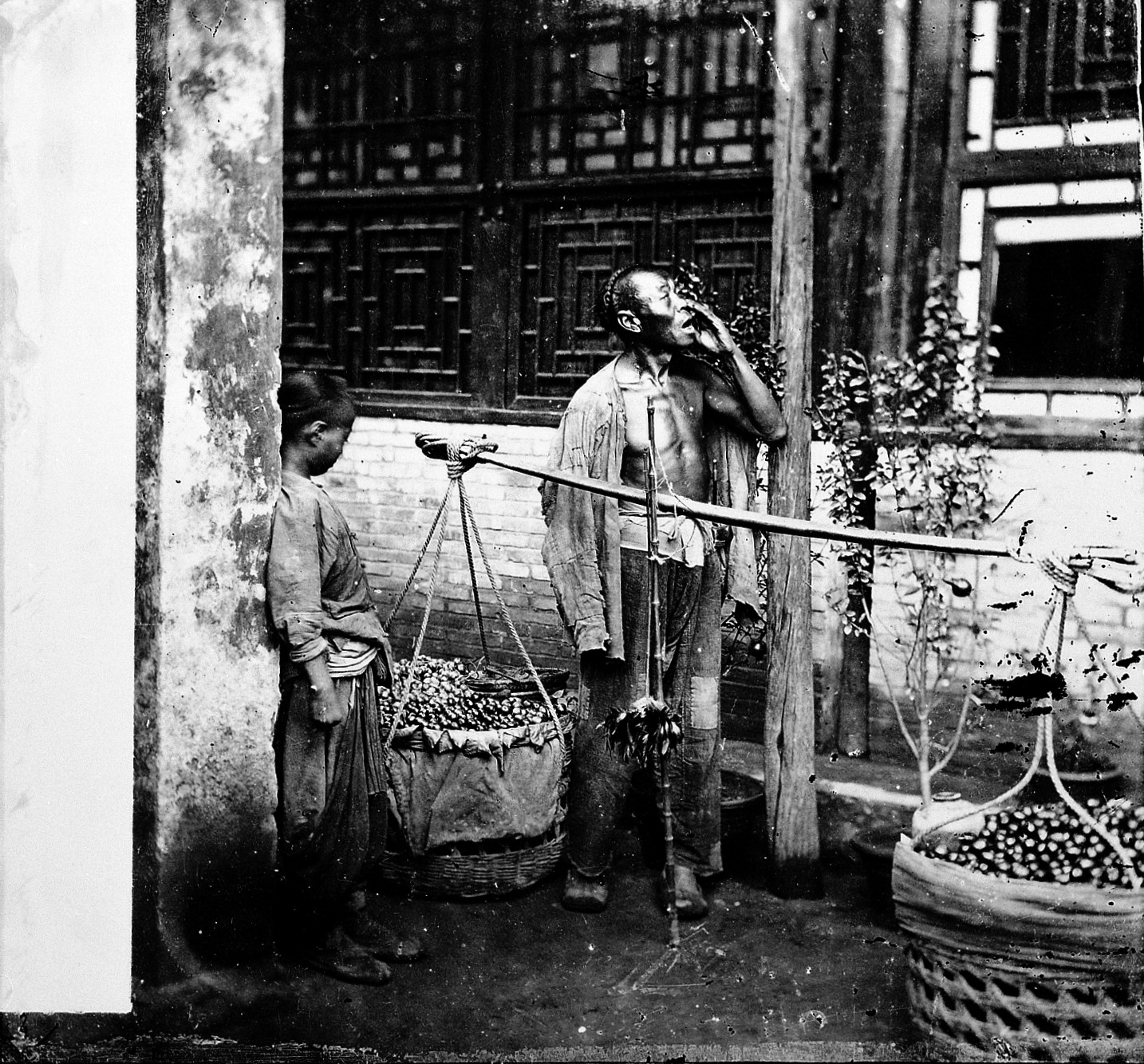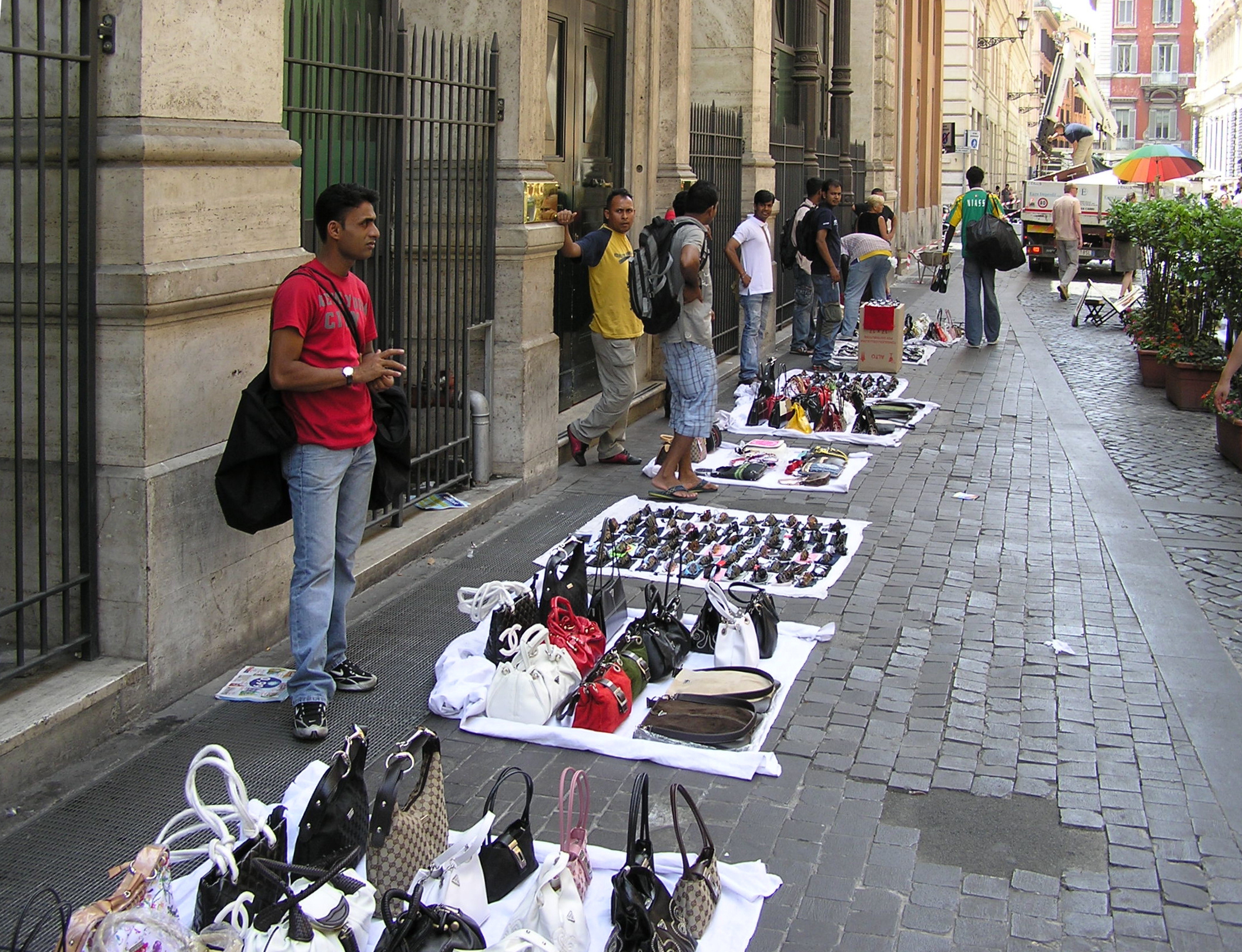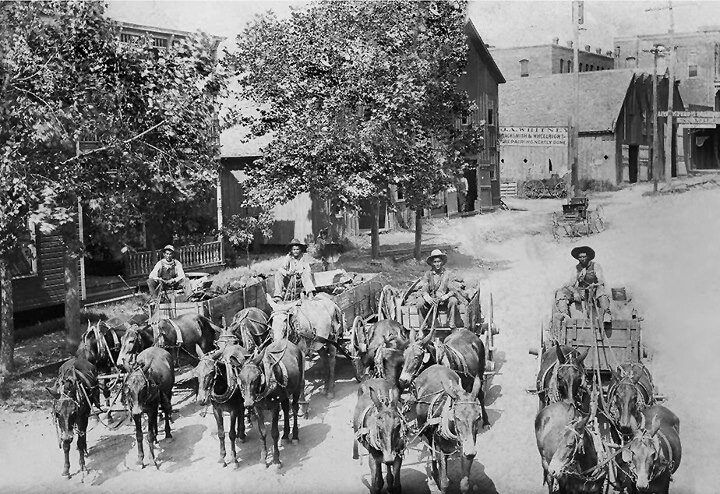|
Peddler
A peddler, in British English pedlar, also known as a chapman, packman, cheapjack, hawker, higler, huckster, (coster)monger, colporteur or solicitor, is a door-to-door and/or travelling vendor of goods. In England, the term was mostly used for travellers hawking goods in the countryside to small towns and villages. In London, more specific terms were used, such as costermonger. From antiquity, peddlers filled the gaps in the formal market economy by providing consumers with the convenience of door-to-door service. They operated alongside town markets and fairs where they often purchased surplus stocks which were subsequently resold to consumers. Peddlers were able to distribute goods to the more geographically-isolated communities such as those who lived in mountainous regions of Europe. They also called on consumers who, for whatever reason, found it difficult to attend town markets. Thus, peddlers played an important role in linking these consumers and regions to wider trade ... [...More Info...] [...Related Items...] OR: [Wikipedia] [Google] [Baidu] |
Arabber
An arabber (or a-rabber) is a street vendor (hawker) selling fruits and vegetables from a colorful, horse-drawn cart. Once a common sight in American East Coast cities, only a handful of arabbers still walk the streets of Baltimore. They rely on street cries to attract the attention of their customers. Arabbing The term ''arabber'' is believed to derive from the 19th century slang term " street Arabs". Arabbing began in the early 19th-century when access to ships and stables made it an accessible form of entrepreneurship. African American men entered the trade following the Civil War. Brightly painted and artfully arranged, arabber carts became a common sight on the streets of Baltimore. To alert city dwellers to their arrival, arabbers developed distinctive calls: Holler, holler, holler, till my throat get sore. If it wasn't for the pretty girls, I wouldn't have to holler no more. I say, Watermelon! Watermelon! Got 'em red to the rind, lady. During World War II, factory jobs ... [...More Info...] [...Related Items...] OR: [Wikipedia] [Google] [Baidu] |
Hawker (trade)
A hawker is a vendor of merchandise that can be easily transported; the term is roughly synonymous with costermonger or peddler. In most places where the term is used, a hawker sells inexpensive goods, handicrafts, or food items. Whether stationary or mobile, hawkers often advertise by loud street cries or chants, and conduct banter with customers, to attract attention and enhance sales. Definition A hawker is a type of street vendor; “a person who travels from place-to-place selling goods.” Synonyms include huckster, peddler, chapman or in Britain, costermonger. However, hawkers are distinguished from other types of street vendors in that they are mobile. In contrast, peddlers, for example, may take up a temporary pitch in a public place. Similarly, hawkers tend to be associated with the sale of non-perishable items such as brushes and cookware while costermongers are exclusively associated with the sale of fresh produce. When accompanied by a demonstration or detailed expl ... [...More Info...] [...Related Items...] OR: [Wikipedia] [Google] [Baidu] |
Costermonger
A costermonger, coster, or costard is a street seller of fruit and vegetables in British towns. The term is derived from the words ''costard'' (a medieval variety of apple) and ''monger'' (seller), and later came to be used to describe hawkers in general. Some historians have pointed out that a hierarchy existed within the costermonger class and that while costermongers sold from a handcart or animal-drawn cart, mere hawkers carried their wares in a basket. Costermongers met a need for rapid food distribution from the wholesale markets (e.g., in London: Smithfield for meat, Spitalfields for fruit and vegetables or Billingsgate for fish) by providing retail sales at locations that were convenient for the labouring classes. Costermongers used a variety of devices to transport and display produce: a cart might be stationary at a market stall; a mobile (horse-drawn or wheelbarrow) apparatus or a hand-held basket might be used for light-weight goods such as herbs and flowers. Cost ... [...More Info...] [...Related Items...] OR: [Wikipedia] [Google] [Baidu] |
Hawker (trade)
A hawker is a vendor of merchandise that can be easily transported; the term is roughly synonymous with costermonger or peddler. In most places where the term is used, a hawker sells inexpensive goods, handicrafts, or food items. Whether stationary or mobile, hawkers often advertise by loud street cries or chants, and conduct banter with customers, to attract attention and enhance sales. Definition A hawker is a type of street vendor; “a person who travels from place-to-place selling goods.” Synonyms include huckster, peddler, chapman or in Britain, costermonger. However, hawkers are distinguished from other types of street vendors in that they are mobile. In contrast, peddlers, for example, may take up a temporary pitch in a public place. Similarly, hawkers tend to be associated with the sale of non-perishable items such as brushes and cookware while costermongers are exclusively associated with the sale of fresh produce. When accompanied by a demonstration or detailed expl ... [...More Info...] [...Related Items...] OR: [Wikipedia] [Google] [Baidu] |
A Peking Costermonger Selling Fruit Wellcome L0018863
A, or a, is the first Letter (alphabet), letter and the first vowel of the Latin alphabet, Latin alphabet, used in the English alphabet, modern English alphabet, the alphabets of other western European languages and others worldwide. Its name in English is English alphabet#Letter names, ''a'' (pronounced ), plural English alphabet#Letter names, ''aes''. It is similar in shape to the Greek alphabet#History, Ancient Greek letter alpha, from which it derives. The Letter case, uppercase version consists of the two slanting sides of a triangle, crossed in the middle by a horizontal bar. The lowercase version can be written in two forms: the double-storey a and single-storey ɑ. The latter is commonly used in handwriting and fonts based on it, especially fonts intended to be read by children, and is also found in italic type. In English grammar, "English articles, a", and its variant "English articles#Indefinite article, an", are Article (grammar)#Indefinite article, indefinite arti ... [...More Info...] [...Related Items...] OR: [Wikipedia] [Google] [Baidu] |
Performing Arts
The performing arts are arts such as music, dance, and drama which are performed for an audience. They are different from the visual arts, which are the use of paint, canvas or various materials to create physical or static art objects. Performing arts include a range of disciplines which are performed in front of a live audience, including theatre, music, and dance. Theatre, music, dance, object manipulation, and other kinds of performances are present in all human cultures. The history of music and dance date to pre-historic times whereas circus skills date to at least Ancient Egypt. Many performing arts are performed professionally. Performance can be in purpose-built buildings, such as theatres and opera houses, on open air stages at festivals, on stages in tents such as circuses or on the street. Live performances before an audience are a form of entertainment. The development of audio and video recording has allowed for private consumption of the performing arts. The pe ... [...More Info...] [...Related Items...] OR: [Wikipedia] [Google] [Baidu] |
Healer (alternative Medicine)
Healer may refer to: Conventional medicine *Doctor of Medicine * Health professional Alternative medicine * Faith healer * Folk healer * Healer (alternative medicine), someone who purports to aid recovery from ill health * Spiritual healer Film and television * ''The Healer'' (1935 film), an American film by Reginald Barker * ''The Healers'' (film), a 1974 American TV film featuring Lance Kerwin * "Healer" (''The Twilight Zone''), a 1985 episode of ''The New Twilight Zone'' * ''Healer'' (film), a 1994 American film starring Tyrone Power, Jr * ''The Healer'', a 1994 British TV film starring Paul Rhys * "The Healer" (''Law & Order: Criminal Intent''), a 2006 episode of ''Law & Order: Criminal Intent'' * ''Healer'' (TV series), a 2014 South Korean television series * ''The Healer'' (2016 film), a comedy-drama film starring Oliver Jackson-Cohen, Jonathan Pryce, Camilla Luddington * ''The Healers'' (audio drama), an audio drama based on ''Doctor Who'' Music * ''The ... [...More Info...] [...Related Items...] OR: [Wikipedia] [Google] [Baidu] |
Fortune-telling
Fortune telling is the practice of predicting information about a person's life. Melton, J. Gordon. (2008). ''The Encyclopedia of Religious Phenomena''. Visible Ink Press. pp. 115-116. The scope of fortune telling is in principle identical with the practice of divination. The difference is that divination is the term used for predictions considered part of a religious ritual, invoking deities or spirits, while the term fortune telling implies a less serious or formal setting, even one of popular culture, where belief in occult workings behind the prediction is less prominent than the concept of suggestion, spiritual or practical advisory or affirmation. Historically, Pliny the Elder describes use of the crystal ball in the 1st century CE by soothsayers (''"crystallum orbis"'', later written in Medieval Latin by scribes as ''orbuculum''). Contemporary Western images of fortune telling grow out of folkloristic reception of Renaissance magic, specifically associated with R ... [...More Info...] [...Related Items...] OR: [Wikipedia] [Google] [Baidu] |
Cart
A cart or dray (Australia and New Zealand) is a vehicle designed for transport, using two wheels and normally pulled by one or a pair of draught animals. A handcart is pulled or pushed by one or more people. It is different from the flatbed trolley also known as a dray, (for freight) or wagon, which is a heavy transport vehicle with four wheels and typically two or more humans. Over time, the term "cart" has come to mean nearly any small conveyance, including shopping carts, golf carts, gokarts, and UTVs, without regard to number of wheels, load carried, or means of propulsion. The draught animals used for carts may be horses, donkeys or mules, oxen, and even smaller animals such as goats or large dogs. History Carts have been mentioned in literature as far back as the second millennium B.C. Handcarts pushed by humans have been used around the world. In the 19th century, for instance, some Mormons traveling across the plains of the United States between 1856 and 1860 use ... [...More Info...] [...Related Items...] OR: [Wikipedia] [Google] [Baidu] |
Potion
A potion () is a liquid "that contains medicine, poison, or something that is supposed to have magic powers.” It derives from the Latin word ''potus'' which referred to a drink or drinking. The term philtre is also used, often specifically for a love potion, a potion that is supposed to create feelings of love or attraction in the one who drinks it. Throughout history there have been several types of potions for a range of purposes. Reasons for taking potions ranged from curing an illness, to securing immortality to trying to induce love. These potions, while often ineffective or poisonous, occasionally had some degree of medicinal success depending on what they sought to fix and the type and amount of ingredients used. Some popular ingredients used in potions across history include Spanish fly, nightshade plants, cannabis and opium. During the 17th to 19th century, it was common in Europe to see peddlers offering potions for ailments ranging from heartbreak to the plague ... [...More Info...] [...Related Items...] OR: [Wikipedia] [Google] [Baidu] |
Wagon
A wagon or waggon is a heavy four-wheeled vehicle pulled by draught animals or on occasion by humans, used for transporting goods, commodities, agricultural materials, supplies and sometimes people. Wagons are immediately distinguished from carts (which have two wheels) and from lighter four-wheeled vehicles primarily for carrying people, such as carriages. Animals such as horses, mules, or oxen usually pull wagons. One animal or several, often in pairs or teams may pull wagons. However, there are examples of human-propelled wagons, such as mining corfs. A wagon was formerly called a wain and one who builds or repairs wagons is a wainwright. More specifically, a wain is a type of horse- or oxen-drawn, load-carrying vehicle, used for agricultural purposes rather than transporting people. A wagon or cart, usually four-wheeled; for example, a haywain, normally has four wheels, but the term has now acquired slightly poetical connotations, so is not always used with technical ... [...More Info...] [...Related Items...] OR: [Wikipedia] [Google] [Baidu] |
Itinerant Groups In Europe
An itinerant is a person who travels habitually. Itinerant may refer to: *"Travellers" or itinerant groups in Europe *Itinerant preacher, also known as itinerant minister *Travelling salespeople, see door-to-door, hawker (trade), hawker, and peddler *Travelling showpeople, see Carny (US), Showmen#United Kingdom, Showmen (UK) *The Peredvizhniki or Itinerants, a school of nineteenth-century Russian painters *Vagrancy (people) *People experiencing long-term homelessness *Mendicant *Eyre (legal term) or "itinerant justice" **Justice in Eyre *"Itinerant court" of Charlemagne (and later Carolingian emperors), see Government of the Carolingian Empire * Migrant worker See also *Nomadism (habitual travelling for pasture) *Transhumance *Gypsy (term) *Gypsy (other) {{disambiguation ... [...More Info...] [...Related Items...] OR: [Wikipedia] [Google] [Baidu] |









